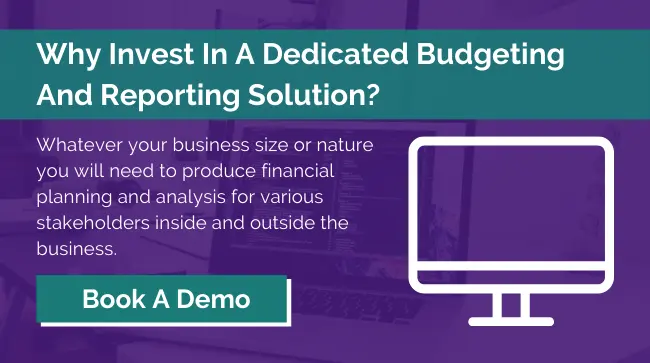The 4 Types Of Budgeting Software Perfect For Businesses
As a Finance Director, you’re always looking for tools that can help you run your finances more efficiently. Budgeting software is one of those tools. Maybe you’ve been using Excel spreadsheets for a while but have realised that they don’t fit the bill anymore. As the business grows, these basic tools become riddled with inefficiencies, limitations, and risks.

The alternative is purpose-designed financial planning budgeting software. If you’re considering switching to this type of tool, this article will explain the 4 types of budgeting software available so you can make an informed decision.
What You Need To Know About Budgeting and Planning Software
Not all budgeting platforms have the same features and integration capabilities – and many may fail to sync correctly with your CRM, accounting software, and other tools. Budgeting tools cover a wide range of applications, which include anything from basic templates to large enterprise-level systems for companies with hundreds of users.
To find the perfect budgeting system for you, it’s crucial to know what your current pain points and needs are – i.e. what you struggle with and the ways in which you’d like the budgeting process to improve. It’s also important to consider how complex your business structure is – what sort of factors and liabilities affect your budgeting and cash flow - and how your company has adapted to change in the past.
Main Types of Budgeting Software
Budgeting software can be cloud-based or you can have it installed locally on your computers and tablets. Cloud-based software is less taxing on your hardware and can normally be accessed from any internet-enabled device, so is perfect for remote working. These platforms have updates installed automatically.
Budgeting tools are further classified into 4 types, depending on their features and the business needs they can accommodate.
1) Entry-level software, which suits small and start-up businesses with a simple financial structure. The benefit of this software is that this can be set up quickly and at a very low cost. On the other hand, this type of software can soon become obsolete due to its limited scope and the low number of users it supports. Moreover, entry-level software can rarely be integrated with other accounting and analytics tools, or doing so is complicated and time-consuming.
2) At the other end of the scale we have enterprise-level budgeting software solutions. These are typically used by larger multi-site businesses with hundreds of users. Because of their complex structure, these businesses require equally complex systems integration, ideally in a single company-wide solution. And of course, their budgeting tools must have advanced features, which also means they’re usually custom-built, pricey, and require expert ongoing management.
3) The middle ground is budgeting software tools designed for SMEs, which offer more flexibility than entry-level counterparts without the hefty price tag of enterprise-level solutions. These tools can typically handle most (if not all) aspects of budgeting and planning for SMEs, including balance sheet and cash flow forecasting, reporting, multi-dimensional analysis, scenario planning, and consolidation. These platforms are designed for businesses geared towards growth, so most of the tools and features can be scaled up or back without much disruption or contractual changes.
4) There’s a fourth type of budgeting software, which involves industry-specific solutions for particular industries, such as financial services or fashion eCommerce. These programmes are highly specialised, with some having advanced strengths in particular aspects of the budgeting process, like financial consolidation, activity-based costing, and sales planning. They are typically designed by small software vendors with direct experience in the field. The platforms are good at what they do but may not be as flexible and responsive as more ‘generic’ enterprise solutions
Next Steps
Budgeting software replaces Excel and gives you access to a more rigorous and collaborative approach to financial planning, management reporting, and budgeting. Knowing which type of software your company needs is vital for the successful management of your business accounts.
If you’d like to discuss all the options and find a tailored and integrated solution to your budgeting needs, get in touch with Account-Ability. We’ll help you escape the treadmill of spreadsheets and get you started on the best budgeting software.
Image Source: Unsplash
Recent Articles
Subscribe to our blog
You May Also Like
These Related Stories

Why you should invest in Budgeting Software: 5 Ways it gives you the best ROI

Future-Proof Your Business With Enterprise Budgeting, Forecasting, And Reporting Software




